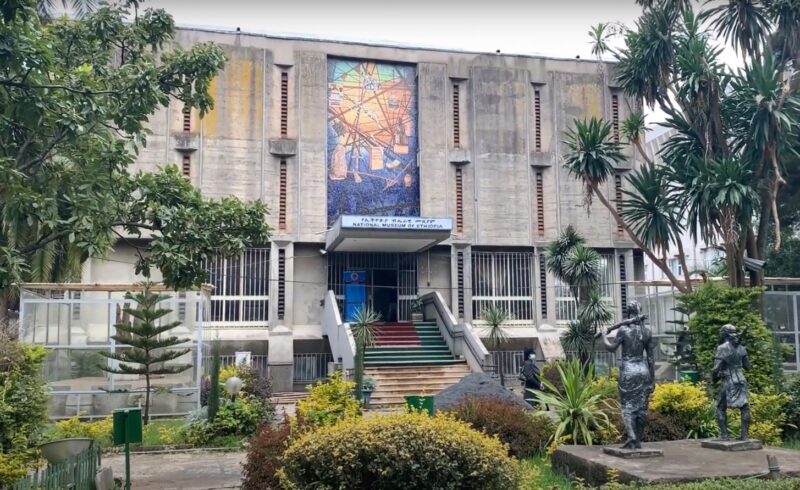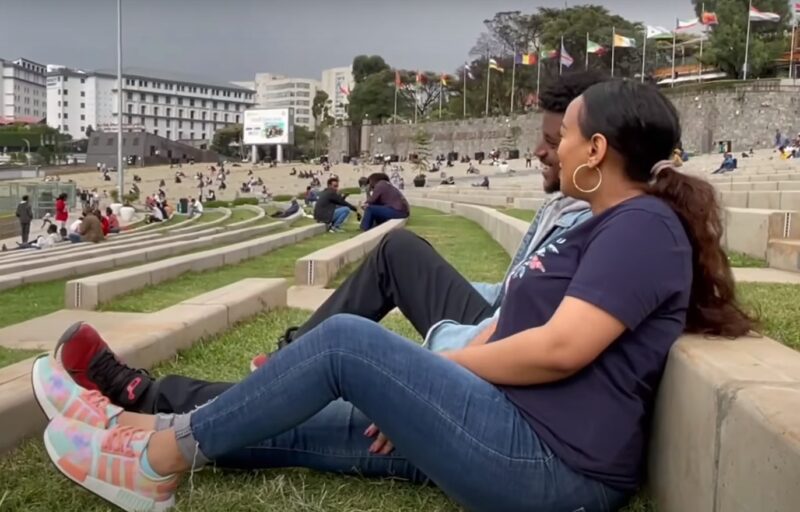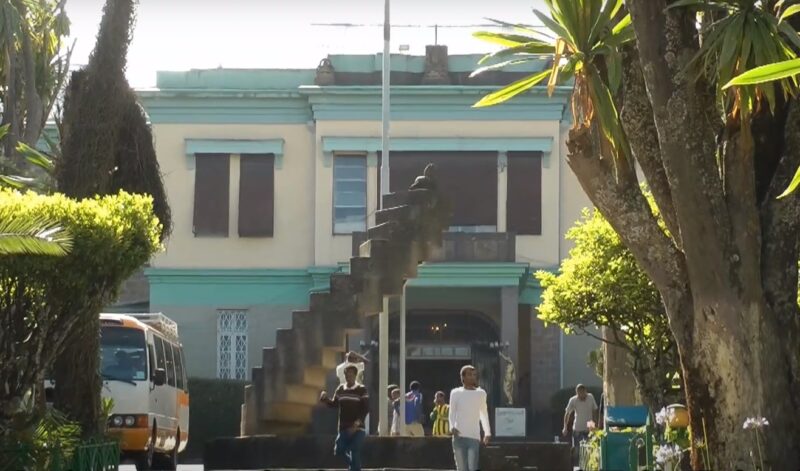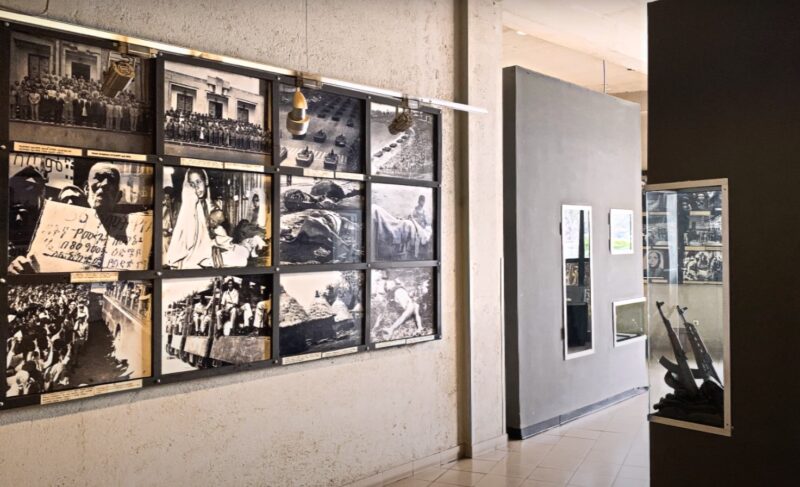Addis Ababa is one of the best evidences of Africa’s enduring spirit and cultural richness. This sprawling metropolis, often referred to as the political capital of Africa due to its historical significance and the presence of numerous international organizations, offers a combination of traditional heritage and rapid modernization.
Visitors to Addis Ababa will find themselves immersed in a city that is both a gateway to Ethiopia’s ancient past and a dynamic center of contemporary life.
Now, let us talk about some of the best things you can visit in this wonderful city in 2024.
Key Takeaways:
1. National Museum of Ethiopia

Highlights:
- Home to the famous Lucy fossil
- Extensive collection of Ethiopian art
- Artifacts from prehistoric to modern times
The National Museum of Ethiopia is a treasure trove of history, offering visitors a profound insight into the country’s rich cultural tapestry. Among its most celebrated exhibits is Lucy, the 3.2 million-year-old remains of a hominid that revolutionized our understanding of human evolution.
Walking through the museum’s halls, one can trace Ethiopia’s path from the dawn of humanity to its present-day vibrancy. The art collection spans centuries, featuring intricate Christian manuscripts, traditional Ethiopian crosses, and contemporary works that reflect the country’s artistic evolution.
2. Meskel Square

Highlights:
- Central venue for public gatherings
- Meskel Festival celebrations
- Symbol of Addis Ababa
Meskel Square, a vast open space in the heart of the city, serves as the city’s focal point for celebrations, demonstrations, and daily social interactions. Named after the Meskel Festival, an annual religious event celebrated with fervor across Ethiopia, the square witnesses the gathering of thousands, united in faith and festivity.
The square is a symbol of Addis Ababa’s identity, embodying the city’s blend of tradition and modernity. Visitors can feel the pulse of the city here, amidst the ebb and flow of its inhabitants, against the backdrop of Ethiopia’s dynamic capital.
3. Fendika Azmari Bet

Highlights:
- Premier venue for Ethio-jazz
- Traditional Ethiopian music and dance performances
- Cultural hub
Fendika Azmari Bet is a beacon of Ethiopian music and culture in Addis Ababa. This intimate club, located in the city’s bustling streets, offers an immersive experience into Ethio-jazz, a genre that fuses traditional Ethiopian scales with jazz improvisation.
The venue’s atmosphere is electrifying, with live performances that captivate both locals and travelers. Fendika is a cultural hub, where the spirit of Ethiopia is celebrated through dance, art, and poetry. A night here is not just entertainment; it’s an invitation to delve into the soul of Ethiopian artistic expression.
4. Merkato
Highlights:
- Africa’s largest open-air market
- A maze of vendors selling everything from spices to textiles
- A microcosm of Ethiopian commerce.
Merkato is a sprawling marketplace that pulsates with the lifeblood of Addis Ababa. It’s a place where the commerce, culture, and community of Ethiopia converge, offering an unparalleled shopping experience.
From aromatic spices and colorful textiles to handmade crafts and everyday essentials, Merkato is an indication of local culture’s vibrant trade and craftsmanship. Exploring this market is an adventure in itself, offering insights into the daily lives of Ethiopians and the country’s rich traditions of commerce and creativity.
5. Ethnological Museum

Highlights:
- Located in Haile Selassie’s former palace
- Exhibits on Ethiopian cultural diversity, life cycle rituals
- Religious art
The Ethnological Museum, situated within the serene grounds of Addis Ababa University, offers a deep dive into Ethiopia’s cultural heritage. Housed in what was once Emperor Haile Selassie’s palace, the museum presents a fascinating array of exhibits that explore the customs, beliefs, and art of Ethiopia’s many ethnic groups.
From birth to death, the museum chronicles the rituals and practices that define the Ethiopian way of life, alongside stunning displays of religious icons, manuscripts, and traditional attire.
6. The Entoto Hills
Highlights:
- Panoramic views of Addis Ababa
- Historical significance
- Ntural beauty and hiking trails
Rising above Addis Ababa, the Entoto Hills offer a tranquil escape from the city’s hustle and bustle. These hills are not only a natural haven but also a site of historical importance, once serving as the capital of Ethiopia before the establishment of Addis Ababa.
Today, visitors can explore the scenic trails, visit the historic Entoto Maryam Church, and enjoy breathtaking views of the city below. The cooler climate and lush surroundings make it an ideal spot for hiking, picnicking, and reflection. From its summit, one can gaze out over Addis Ababa, contemplating the city’s past, present, and future.
7. Addis Fine Art
Highlights:
- Leading gallery for contemporary Ethiopian art
- Support for local and diaspora artists
- Vibrant art scene
Addis Fine Art is at the forefront of Addis Ababa’s burgeoning contemporary art scene. This gallery is dedicated to showcasing the work of Ethiopian artists, both from within the country and its diaspora, offering a platform for innovative and thought-provoking art.
The exhibitions here span a variety of mediums, from painting and sculpture to photography and multimedia installations, reflecting the dynamic and diverse nature of Ethiopian contemporary art. For art enthusiasts and casual visitors alike, Addis Fine Art provides a window into the creative pulse of Ethiopia, highlighting the talent and vision of its artists.
8. Yod Abyssinia Cultural Restaurant
Highlights:
- Authentic Ethiopian cuisine
- Live music and dance performances
- Cultural experience
Yod Abyssinia Cultural Restaurant is an immersive cultural experience. Here, guests can savor the flavors of traditional Ethiopian cuisine, served in the communal style that is central to the local dining culture.
The restaurant comes alive at night with vibrant performances of music and dance, showcasing the traditions of Ethiopia’s ethnic groups. Dining at Yod Abyssinia is an opportunity to engage all the senses, offering a taste of Ethiopia’s rich culinary heritage and the lively spirit of its people.
9. Red Terror Martyrs’ Memorial Museum

Highlights:
- Tribute to the victims of the Derg regime
- Educational exhibits
- Modern Ethiopian history
The Red Terror Martyrs’ Memorial Museum serves as a poignant reminder of Ethiopia’s recent past, specifically the period of the Red Terror under the Derg regime. Through its powerful exhibits, the museum honors the memory of those who lost their lives during this tumultuous time, offering visitors a sobering look at the impact of political violence on a nation and its people.
The museum’s mission is not only to remember the victims but also to educate future generations about the importance of peace, justice, and reconciliation. A visit here is a moving experience, reflecting on the resilience of the Ethiopian spirit in the face of adversity.
10. Unity Park
Highlights:
- Located within the National Palace grounds
- Showcases Ethiopia’s cultural heritage and biodiversity
- Symbol of national unity.
Unity Park is a recent addition to Addis Ababa’s attractions, offering a unique insight into Ethiopia’s cultural and natural heritage. Situated within the grounds of the National Palace, the park features beautifully landscaped gardens, historical monuments, and exhibits that celebrate the country’s diverse cultures and ecosystems.
Unity Park symbolizes Ethiopia’s commitment to national unity and pride, inviting visitors to explore its rich heritage in a serene and picturesque setting.
FAQs
How much does a meal cost in Addis Ababa?
A meal in Addis Ababa can vary widely in price. On average, a meal at an inexpensive restaurant may cost between $3 to $5, while dining at a mid-range restaurant could set you back about $10 to $20 per person.
Why do tourists go to Ethiopia?
Tourists are drawn to Ethiopia for countless reasons. Attractions include the rock-hewn churches of Lalibela, the obelisks of Axum, the tribes of the Omo Valley, and the Simien Mountains. Ethiopia’s unique cuisine and coffee culture also attract visitors. Also, the Great Rift Valley is quite close.
How much money do you need for Ethiopia?
For a comfortable trip to Ethiopia, budget around $50 to $150 per day. This includes accommodation, meals, transportation, and entrance fees to attractions. Budget travelers could spend less by choosing more affordable lodging and dining options.
Can I wear shorts in Addis Ababa?
Yes, you can wear shorts in Addis Ababa, especially in casual settings or while exploring the city on hot days. However, it’s advisable to dress modestly when visiting religious sites or in rural areas to respect local customs and sensibilities.
Final Reflections
Addis Ababa offers a plethora of experiences to its visitors. From exploring ancient artifacts and engaging with contemporary art to enjoying the natural landscapes and indulging in traditional cuisine, the city provides a comprehensive glimpse into Ethiopia’s soul.
Visitors are encouraged to venture beyond the city limits to experience the full breadth of Ethiopia’s heritage and natural wonders, ensuring an experience that is as enriching as it is unforgettable.
